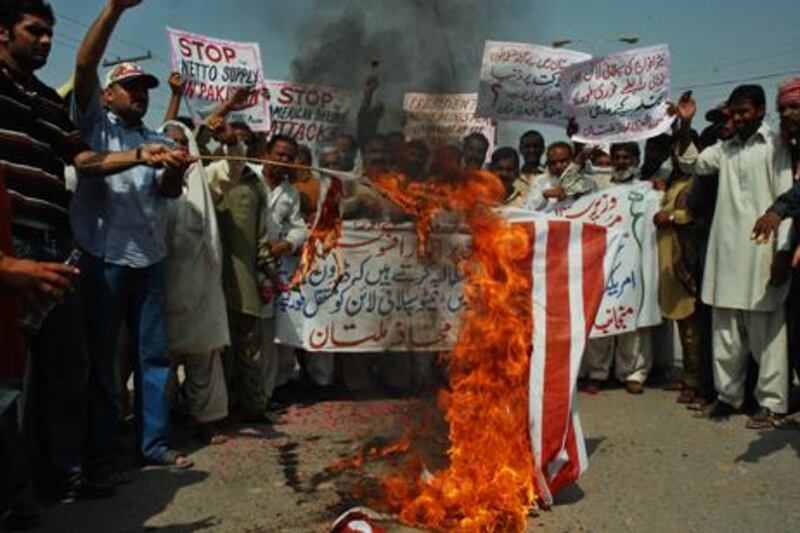ISLAMABAD // The United States and Pakistan are expected to emerge from their latest round of strategic dialogue tomorrow with a public display of unity that masks Washington's growing frustration with its key ally, analysts said.
Officials began the talks yesterday - the third round since the relationship was allegedly upgraded by the US to strategic partner status in March - against a backdrop of deteriorating relations.
The September 30 killing of three Pakistani soldiers by US military helicopters, which crossed from neighbouring Afghanistan in pursuit of retreating Taliban fighters, has caused outrage in Islamabad.
Pakistan responded by closing one of two major supply routes through its territory to Nato forces, and merely shrugged its shoulders when suspected militants seized the opportunity to mount repeated attacks on fuel tankers parked at depots around the country.
The Pentagon apologised for the killings on October 15, leading to Pakistan's reopening of the supply route on Sunday.
The tensions reflect the deeply conflicted nature of the relationship, but they are neither new nor indicative of a major disintegration, the analysts said.
"I think this would be a major patch-up session; they are working on a joint statement that would say all the right things, said Maleeha Lodhi, a newspaper editor and former Pakistani ambassador to the US, in an interview.
"Both sides would want to emphasise and reaffirm the positives of the relationship because they want to see a sense of normalcy return, and both sides need it."
The strategic dialogue was of great diplomatic significance because it underscored a US commitment to Pakistan that went beyond the war in Afghanistan, she said.
The New York Times on Tuesday reported that the US would offer Pakistan a multi-year security cooperation agreement, including increased aid for the country's powerful military.
CNN also reported on Tuesday the programme would be worth US$2 billion (Dh7.3) over five years, matching the duration of a $7.5 billion civilian economic assistance programme approved by the US Congress last year.
However, many observers believe the offer may be tied to a time-lined Pakistani commitment to launch a military operation against Taliban and al Qa'eda militants based in the North Waziristan tribal region.
The US president, Barack Obama, has repeatedly identified North Waziristan as the headquarters of al Qa'eda and a base for factions of the Afghan Taliban.
In a report sent to Congress on October 4, the Obama administration said the Pakistani military had "continued to avoid military engagements that would put it in direct conflict with Afghan Taliban or al Qa'eda forces in North Waziristan", calling it a "political choice".
Prior to the report, the US government, at Pakistan's request, had since January toned down public pressure to move on North Waziristan.
The diplomatic silence was broken last week. Robert Gates, the secretary of defence, and Admiral Mike Mullen, chairman of the US Joint Chiefs of Staff, in separate media interviews reminded the Pakistani army chief, Gen Ashfaq Kayani, of his December 2009 commitment to launch an operation in the region.
Their remarks accompanied a dramatic increase in drone attacks this month on targets in North Waziristan that US officials said targeted camps where westerners were being trained to mount terrorist attacks in Europe.
Although US officials chose their words carefully to avoid embarrassing their Pakistani allies, Islamabad responded sharply.
Abdul Basit, a spokesman for Pakistan's foreign office, said on Friday the decision on "when, how and what is to be done in North Waziristan" would be based on Islamabad's judgment, keeping in mind its capacity, priorities and overall national interest.
Analysts based in the US said Pakistan needs to be mindful of increasing frustration with it in Washington's political circles.
"People are at breaking point, in the case of [ignored calls for] military action," said Christine Fair, a security expert at Georgetown University, and consultant on Afghanistan and Pakistan to the Pentagon.
"Congress is exhausted that $19 billion has been given [since 2002] to Pakistan, but it still sides with the Talib. There are people who just want Pakistan to be declared an enemy state."
She said the perceived lack of reciprocity by Pakistan, cited in September by Hillary Clinton, the secretary of state, had contributed to a growing sense that Pakistan was ambiguous on whether it even wanted a strategic relationship with the US.
"The closer the US wants to get, the more Pakistan seems to squeeze out," she said.
Ms Lodhi, the former Pakistani ambassador, agreed that the relationship was "deeply conflicted", but said recent tensions should be viewed as turbulence reflective of their increasing engagement.
"The closer you get, the more the problems," she said.





